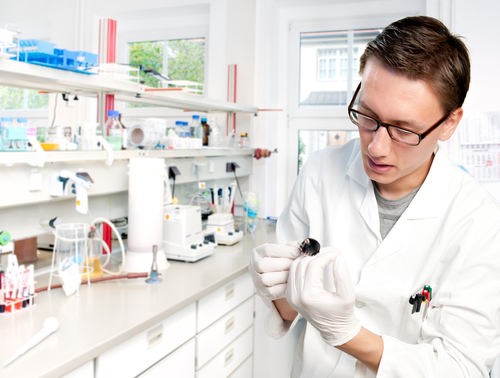Inhibiting the inflammatory molecule Fn14 with new compounds or antibodies may reduce inflammation and tissue scarring in people with Crohn’s disease, a study suggests.
The study, “TWEAK/Fn14 Is Overexpressed in Crohn’s Disease and Mediates Experimental Ileitis by Regulating Critical Innate and Adaptive Immune Pathways,” was published in the journal Cellular and Molecular Gastroenterology and Hepatology.
Crohn’s disease is a debilitating inflammatory disorder that affects the intestines and impairs their normal function.
A family of proteins that are present in cells — called the tumor necrosis factors (TNFs) — are believed to be key regulators of intestinal inflammation. In particular, a protein called tumor necrosis factor–like weak inducer of apoptosis (TWEAK), and its receptor, known as fibroblast growth factor-inducible 14 (Fn14), are thought to be involved in the underlying mechanisms associated with Crohn’s disease.
Several studies have shown that activation of TWEAK/Fn14 signals can be beneficial during early tissue injury. However, constant activation during chronic inflammation can actually cause more damage, leading to fibrosis (tissue scarring).
One of the tissue types most heavily influenced by TWEAK/Fn14 during chronic inflammation is that of the intestines. Continued stimulation of Fn14 in the intestines can lead to excessive gut pro-inflammatory immune responses, causing significant damage to the tissue.
“During early inflammation, TWEAK/Fn14 activates to heal tissue damage,” Fabio Cominelli, MD, chief of gastroenterology at University Hospitals Cleveland Medical Center, and the study’s senior author, said in a press release. “However, during later, chronic inflammation, increased and persistent levels of Fn14 may lead to pathologic inflammation and fibrosis.”
These effects have been shown in models of colitis that are induced by repeated early injury. However, the role of TWEAK/Fn14 in an animal model of Crohn’s-like disease had not been investigated.
To shed light on this matter, a group of researchers at Case Western Reserve University set out to determine the role of TWEAK/Fn14 in Crohn’s disease.
The team used the SAMP1/YitFc (SAMP) mouse strain, which represents a well-established model of immune system-driven Crohn’s-like disease, with important similarities to the human disease. The mice develop chronic, small intestinal inflammation after 10 weeks of age, and are characterized by discontinuous inflammation and fibrosis.
To study the role of Fn14, researchers genetically manipulated SAMP mice to lack the Fn14 receptor.
These mice experienced significantly reduced inflammation of the intestines at 20 weeks of age and had less severe disease compared with SAMP controls. In particular, they had reduced infiltration of immune cells in the intestine tissue.
Additionally, Fn14 was found to be necessary for the underlying pro-inflammatory process, with multiple pro- and anti-inflammatory immune system-related pathways being modulated upon Fn14 deletion.
Analysis of surgically resected intestinal tissue and mucosal biopsy specimens from patients with active Crohn’s disease or ulcerative colitis, and from healthy people (controls), revealed that those with Crohn’s had significantly higher levels of TWEAK and Fn14 compared with the two other groups.
Based on these findings the team believes that “TWEAK/Fn14 are up-regulated in Crohn’s disease,” and are implicated in the pro-inflammatory mechanisms of this disease.
Inhibition of Fn14 using novel pharmacological agents or antibodies may represent an alternative strategy to improve inflammation and fibrosis in Crohn’s disease. “This research establishes the rationale for investigating innovative therapies that can improve and save lives,” Cominelli said.

